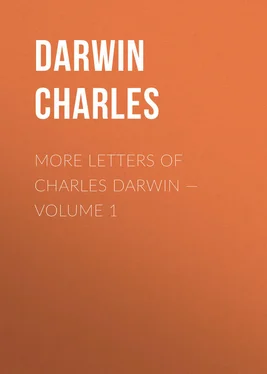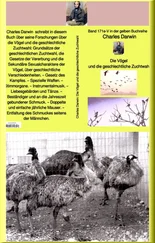Charles Darwin - More Letters of Charles Darwin — Volume 1
Здесь есть возможность читать онлайн «Charles Darwin - More Letters of Charles Darwin — Volume 1» — ознакомительный отрывок электронной книги совершенно бесплатно, а после прочтения отрывка купить полную версию. В некоторых случаях можно слушать аудио, скачать через торрент в формате fb2 и присутствует краткое содержание. Жанр: foreign_antique, foreign_prose, на английском языке. Описание произведения, (предисловие) а так же отзывы посетителей доступны на портале библиотеки ЛибКат.
- Название:More Letters of Charles Darwin — Volume 1
- Автор:
- Жанр:
- Год:неизвестен
- ISBN:нет данных
- Рейтинг книги:4 / 5. Голосов: 1
-
Избранное:Добавить в избранное
- Отзывы:
-
Ваша оценка:
- 80
- 1
- 2
- 3
- 4
- 5
More Letters of Charles Darwin — Volume 1: краткое содержание, описание и аннотация
Предлагаем к чтению аннотацию, описание, краткое содержание или предисловие (зависит от того, что написал сам автор книги «More Letters of Charles Darwin — Volume 1»). Если вы не нашли необходимую информацию о книге — напишите в комментариях, мы постараемся отыскать её.
More Letters of Charles Darwin — Volume 1 — читать онлайн ознакомительный отрывок
Ниже представлен текст книги, разбитый по страницам. Система сохранения места последней прочитанной страницы, позволяет с удобством читать онлайн бесплатно книгу «More Letters of Charles Darwin — Volume 1», без необходимости каждый раз заново искать на чём Вы остановились. Поставьте закладку, и сможете в любой момент перейти на страницу, на которой закончили чтение.
Интервал:
Закладка:
January 9th: "Looking over MS. on Variation." Paper on the Fertilisation of British Orchids.
July and again in September: Made observations on Drosera. Paper on Moths and Flowers. Publication of "A Naturalist's Voyage."
1861.
Up to July at work on "Variation under Domestication."
April 30th: Publication of Edition III. of "Origin" (2000 copies).
July to the end of year: At work on Orchids.
November: Primula paper read at Linnean Society. Papers on Pumilio and on Fertilisation of Vinca.
1862.
May 15th: Orchid book published. Working at Variation. Paper on Catasetum (Linnean Society). Contribution to Chapter III. of Jenyns' Memoir of Henslow.
1863.
Working at "Variation under Domestication." Papers on Yellow Rain, the Pampas, and on Cirripedes. A review of Bates' paper on Mimetic Butterflies. Severe illness to the end of year.
1864.
Illness continued until April. Paper on Linum published by the Linnean Society.
May 25th: Paper on Lythrum finished.
September 13th: Paper on Climbing Plants finished. Work on "Variation under Domestication."
November 30th: Copley medal awarded to him.
1865.
January 1st: Continued at work on Variation until April 22nd. The work was interrupted by illness until late in the autumn.
February: Read paper on Climbing Plants.
December 25th: Began again on Variation.
1866.
Continued work at "Variation under Domestication."
March 1st to May 10th: At work on Edition IV. of the "Origin." Published June (1250 copies). Read paper on Cytisus scoparius to the Linnean Society.
December 22nd: Began the last chapter of "Variation under Domestication."
1867.
November 15th: Finished revises of "Variation under Domestication."
December: Began papers on Illegitimate Unions of Dimorphic and Trimorphic Plants, and on Primula.
1868.
January 30th: Publication of "Variation under Domestication."
February 4th: Began work on Man.
February 10th: New edition of "Variation under Domestication." Read papers on Illegitimate Unions of Dimorphic and Trimorphic Plants, and on Verbascum.
1869.
February 10th: "Finished fifth edition of 'Origin'; has taken me forty-six days."
Edition V. published in May.
Working at the "Descent of Man." Papers on the Fertilisation of Orchids, and on the Fertilisation of Winter-flowering Plants.
1870.
Working at the "Descent of Man." Paper on the Pampas Woodpecker.
1871.
January 17th: Began the "Expression of the Emotions."
February 24th: "Descent of Man" published (2500 copies).
April 27th: Finished the rough copy of "Expression."
June 18th: Began Edition VI. of "Origin." Paper on the Fertilisation of Leschenaultia.
1872.
January 10th: Finished proofs of Edition VI. of the "Origin," and "again rewriting 'Expression.'"
August 22nd: Finished last proofs of "Expression."
August 23rd: Began working at Drosera.
November: "Expression" published (7000 copies, and 2000 more printed at the end of the year.)
November 8th: "At Murray's sale 5267 copies sold to London booksellers."
1873.
January: Correcting the Climbing Plants paper for publication as a book.
February 3rd: At work on "Cross-fertilisation."
February to September: Contributions to "Nature."
June 14th: "Began Drosera again."
November 20th: Began "Descent of Man," Edition II.
1874.
"Descent of Man," Edition II, in one volume, published (Preface dated September). "Coral Reefs," Edition II., published.
April 1st: Began "Insectivorous Plants."
February to May: Contributed notes to "Nature."
1875.
July 2nd: "Insectivorous Plants" published (3000 copies); 2700 copies sold immediately.
July 6th: "Correcting 2nd edition of 'Variation under Domestication.'" It was published in the autumn.
September 1st (approximately): Began on "Cross and Self-Fertilisation."
November: Vivisection Commission.
1876.
May 5th: "Finished MS., first time over, of 'Cross and Self-Fertilisation.'"
May to June: Correction of "Fertilisation of Orchids," Edition II. Wrote his Autobiographical Sketch.
May and November: Contributions to "Nature."
August 19th: First proofs of "Cross and Self-Fertilisation."
November 10th: "Cross and Self-Fertilisation" published (1500 copies).
1877.
"All the early part of summer at work on 'Different Forms of Flowers.'"
July: Publication of "Different Forms of Flowers" (1250 copies). During the rest of the year at work on the bloom on leaves, movements of plants, "and a little on worms."
November: LL.D. at Cambridge. Second edition of "Fertilisation of Orchids" published. Contributions to "Nature," "Gardeners' Chronicle," and "Mind."
1878.
The whole year at work on movements of plants, and on the bloom on leaves.
May: Contribution to "Nature." Second edition of "Different Forms of Flowers." Wrote prefatory letter to Kerner's "Flowers and their Unbidden Guests."
1879.
The whole year at work on movements of plants, except for "about six weeks" in the spring and early summer given to the "Life of Erasmus Darwin," which was published in the autumn. Contributions to "Nature."
1880. "All spring finishing MS. of 'Power of Movement in Plants' and proof sheets." "Began in autumn on Worms." Prefatory notice written for Meldola's translation of Weismann's book.
November 6th: 1500 copies of "Power of Movement" sold at Murray's sale. Contributions to "Nature."
1881.
During all the early part of the year at work on the "Worm book." Several contributions to "Nature."
October 10th: The book on "Earthworms" published: 2000 copies sold at once.
November: At work on the action of carbonate of ammonia on plants.
1882.
No entries in the Diary.
February: At work correcting the sixth thousand of the "Earthworms."
March 6th and March 16th: Papers on the action of Carbonate of Ammonia on roots, etc., read at the Linnean Society.
April 6th: Note to "Nature" on Dispersal of Bivalves.
April 18th: Van Dyck's paper on Syrian Dogs, with a preliminary notice by Charles Darwin, read before the Zoological Society.
April 19th: Charles Darwin died at Down.
CHARLES DARWIN
CHAPTER 1.I. — AN AUTOBIOGRAPHICAL FRAGMENT, AND EARLY LETTERS
(Chapter I./1. In the process of removing the remainder of Mr. Darwin's books and papers from Down, the following autobiographical notes, written in 1838, came to light. They seem to us worth publishing — both as giving some new facts, and also as illustrating the interest which he clearly felt in his own development. Many words are omitted in the manuscript, and some names incorrectly spelled; the corrections which have been made are not always indicated.)
My earliest recollection, the date of which I can approximately tell, and which must have been before I was four years old, was when sitting on Caroline's (Caroline Darwin) knee in the drawing room, whilst she was cutting an orange for me, a cow ran by the window which made me jump, so that I received a bad cut, of which I bear the scar to this day. Of this scene I recollect the place where I sat and the cause of the fright, but not the cut itself, and I think my memory is real, and not as often happens in similar cases, {derived} from hearing the thing often repeated, {when} one obtains so vivid an image, that it cannot be separated from memory: because I clearly remember which way the cow ran, which would not probably have been told me. My memory here is an obscure picture, in which from not recollecting any pain I am scarcely conscious of its reference to myself.
1813.
When I was four years and a half old I went to the sea, and stayed there some weeks. I remember many things, but with the exception of the maidservants (and these are not individualised) I recollect none of my family who were there. I remember either myself or Catherine being naughty, and being shut up in a room and trying to break the windows. I have an obscure picture of a house before my eyes, and of a neighbouring small shop, where the owner gave me one fig, but which to my great joy turned out to be two: this fig was given me that the man might kiss the maidservant. I remember a common walk to a kind of well, on the road to which was a cottage shaded with damascene (Chapter I./2. Damson is derived from Damascene; the fruit was formerly known as a "Damask Prune.") trees, inhabited by an old man, called a hermit, with white hair, who used to give us damascenes. I know not whether the damascenes, or the reverence and indistinct fear for this old man produced the greatest effect on my memory. I remember when going there crossing in the carriage a broad ford, and fear and astonishment of white foaming water has made a vivid impression. I think memory of events commences abruptly; that is, I remember these earliest things quite as clearly as others very much later in life, which were equally impressed on me. Some very early recollections are connected with fear at Parkfield and with poor Betty Harvey. I remember with horror her story of people being pushed into the canal by the towing rope, by going the wrong side of the horse. I had the greatest horror of this story — keen instinct against death. Some other recollections are those of vanity — namely, thinking that people were admiring me, in one instance for perseverance and another for boldness in climbing a low tree, and what is odder, a consciousness, as if instinctive, that I was vain, and contempt of myself. My supposed admirer was old Peter Haile the bricklayer, and the tree the mountain ash on the lawn. All my recollections seem to be connected most closely with myself; now Catherine (Catherine Darwin) seems to recollect scenes where others were the chief actors. When my mother died I was 8 1/2 years old, and {Catherine} one year less, yet she remembers all particulars and events of each day whilst I scarcely recollect anything (and so with very many other cases) except being sent for, the memory of going into her room, my father meeting me — crying afterwards. I recollect my mother's gown and scarcely anything of her appearance, except one or two walks with her. I have no distinct remembrance of any conversation, and those only of a very trivial nature. I remember her saying "if she did ask me to do something," which I said she had, "it was solely for my good."
Читать дальшеИнтервал:
Закладка:
Похожие книги на «More Letters of Charles Darwin — Volume 1»
Представляем Вашему вниманию похожие книги на «More Letters of Charles Darwin — Volume 1» списком для выбора. Мы отобрали схожую по названию и смыслу литературу в надежде предоставить читателям больше вариантов отыскать новые, интересные, ещё непрочитанные произведения.
Обсуждение, отзывы о книге «More Letters of Charles Darwin — Volume 1» и просто собственные мнения читателей. Оставьте ваши комментарии, напишите, что Вы думаете о произведении, его смысле или главных героях. Укажите что конкретно понравилось, а что нет, и почему Вы так считаете.












